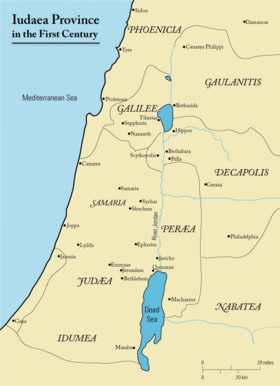
 |
Freethought & Rationalism ArchiveThe archives are read only. |
|
|||||||
|
|
Thread Tools | Search this Thread |
|
|
#1 | |
|
Veteran Member
Join Date: Jun 2010
Location: seattle, wa
Posts: 9,337
|
I happened to stumble on this description of the Peratici in Stromata Book Seven Chapter Whatever:
Quote:
 Clement says that the Peratici are named after a place. The place has to be Perea, the land on the other side of the Jordan river. http://en.wikipedia.org/wiki/Perea_(Bible) I don't know why this isn't mentioned in the article. The author was too busy cramming as much information as possible which distract the reader from the original question. Does anyone know how to update the Wikipedia page? I think this is really important. What fascinates me actually is Clement's original list of heresies. This is not drawn from our Against Heresies by Irenaeus but seems instead to be some ancestor of the Philosophumena. It is interesting to note that Clement was drawing from some heretical syntagma of some sort. Which one? I don't know. But I think this is overlooked in the study of the heresies. Clement witnesses that at least by the beginning of the third century (i.e. before Hippolytus's syntagma) of another text which is providing 'the greater Church' with information about 'the heresies' which wasn't the same as Irenaeus's work (which ultimately became the 'gold standard' in the third century and beyond). The Christian culture of Perea is also quite interesting because Church Fathers keep pointing out this region as the origin of many important texts and traditions including the Gospel of the Hebrews. Theodore Weeden has an interesting theory about ALL or most of the gospels developing from this part of the world. |
|
|
|
|
|
#2 |
|
Veteran Member
Join Date: Nov 2011
Location: UK
Posts: 3,057
|
|
|
|
|
|
#3 |
|
Contributor
Join Date: Jan 2001
Location: Barrayar
Posts: 11,866
|
You can update the page yourself, Stephen, just go to the tabs at the top and pick EDIT and go for it.
|
|
|
|
|
#4 |
|
Veteran Member
Join Date: Nov 2011
Location: UK
Posts: 3,057
|
|
|
|
|
|
#5 |
|
Contributor
Join Date: Jun 2000
Location: Los Angeles area
Posts: 40,549
|
First of all you have to register and then you can edit - but you have to spend some time figuring out the standards and practices. A simple edit should not take a long time, unless the question has some political or religious overtones ....
|
|
|
|
|
#6 | |
|
Veteran Member
Join Date: Nov 2011
Location: UK
Posts: 3,057
|
Quote:
|
|
|
|
|
|
#7 | |
|
Veteran Member
Join Date: Sep 2004
Location: Birmingham UK
Posts: 4,876
|
There is a discussion at Ebionism and Ebionites
Quote:
|
|
|
|
|
|
#8 | |
|
Veteran Member
Join Date: Jun 2010
Location: seattle, wa
Posts: 9,337
|
Thank you Andrew. Knowledgeable as always. I don't know why I am so fascinated by this quote at the end of the Stromata. I think it allows us to pull back the window on the nonsense that is the 'heresiological' reports of the third century.
When you read Irenaeus you get the impression that the heretics called themselves by these stupid appellations. Yet with Clement you realize at once that these were names given to the sects by outsiders (making the typically Latinized Greek forms in Justin and others particularly curious). But look again at the list of names. Clement is clearly telling us that these were names given by outsiders to more or less indefinable 'Christians' in various places: Quote:
I assume that Clement means to say that the Basilideans alone of the three groups named here claimed to be followers of 'Matthew.' It is worth noting that the Hebrew name behind our 'Matthew' and the Greek name 'Dositheus' mean one and the same thing. In other words, was Basilides really a follower of 'Matthew' or somehow connected to Dositheanism. |
|
|
|
| Thread Tools | Search this Thread |
|